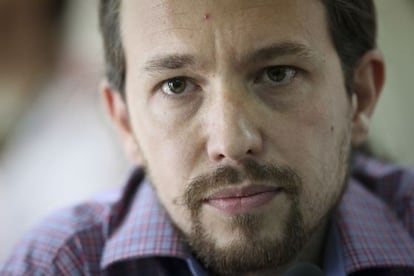Podemos says media needs public control
Pablo Iglesias claims that news outlets cannot be left in the hands of powerful businessmen


The leader of new political party Podemos, Pablo Iglesias, has said that he wants to see public control over the media in order to “guarantee freedom of the press.”
“The media, or at least a portion of it, needs some mechanisms of public control,” states the recently elected eurodeputy in a new book called Conversación con Pablo Iglesias, written by the journalist Jacobo Rivero. The collection of conversations came out after the European elections of May 25, when Podemos took Spain’s political stage by storm in a surprisingly strong showing at the polls.
“If the right to information is a democratic right, then the concentration of property is incompatible with that right,” claims Iglesias, a politics lecturer whose regular presence on television debate shows propelled him to fame and to the top of Podemos. “Something as important as the media, something that is of public interest and is essential to democracy, cannot be exclusively in the hands of multimillionaires.”
TV debates are much more important. Nobody follows parliamentary debates anymore”
This reflection followed a question put to him regarding Ecuador’s controversial Communications Law, approved one year ago and known informally as the “gag law” because local journalists say it has led to self-censorship after several outlets were slapped with hefty fines for failing to report the news to the government’s satisfaction.
In April of this year, Ecuadorean president Rafael Correa told EL PAÍS that “media power is a power, and all powers need social regulation, and you do that with laws. So what’s the problem?”
Like Correa, Iglesias believes that media regulation is necessary because “information management cannot depend solely on businessmen and their will to allow freedom of expression.”
Felipe González stays at five-star hotels and has nothing to do with the Felipe González of 1979”
The eurodeputy does not specify how this media regulation would be implemented, and adds that this does not necessarily mean government control. “Why shouldn’t there be a regulation guaranteeing freedom of the press in the best sense of the word, without any conditions being set by private companies or political parties? Civil society needs to see itself reflected independently and truthfully in the media.”
In a chapter devoted to communication, Iglesias confesses that Podemos’ highly successful strategy for gaining quick exposure was carefully thought out: “What many people did not imagine is that our presence in the media was carefully planned; we had been preparing for this for years.”
Iglesias believes that people “do not subscribe to political parties, they subscribe to media outlets. One person is a La Razón reader, another is an EL PAÍS reader; one person listens to COPE radio station, another one listens to SER.”
That is why, he believes, “television debates are much more important than parliamentary debates. Nobody follows parliamentary debates anymore; besides, nothing is really being debated, it’s a phoney debate, everything has already been negotiated.”
Iglesias also expressed surprise at the fact that his media presence has not been curtailed yet in some media. “But I wouldn’t be surprised if [Socialist leader Alfredo Pérez] Rubalcaba or [Popular Party Prime Minister Mariano] Rajoy have had thoughts about cutting us out of our television appearances. “That is why they won’t debate with me face to face, because they know that they might lose.”
Pablo Iglesias, who was named after the founder of the Spanish Socialist Party, adds that “it is obvious that I am left-wing,” yet is highly critical of one of the Socialist Party’s most respected figures, former prime minister Felipe González.
The leader of Podemos describes González as “a businessman in Latin America. He is a millionaire and an advisor to Carlos Slim and other multimillionaires on the American continent. He stays at five-star hotels and bears no relation with the Felipe González of 1979 who talked about the democracy of the people. Felipe does not like the poor, he hates them.”
Tu suscripción se está usando en otro dispositivo
¿Quieres añadir otro usuario a tu suscripción?
Si continúas leyendo en este dispositivo, no se podrá leer en el otro.
FlechaTu suscripción se está usando en otro dispositivo y solo puedes acceder a EL PAÍS desde un dispositivo a la vez.
Si quieres compartir tu cuenta, cambia tu suscripción a la modalidad Premium, así podrás añadir otro usuario. Cada uno accederá con su propia cuenta de email, lo que os permitirá personalizar vuestra experiencia en EL PAÍS.
En el caso de no saber quién está usando tu cuenta, te recomendamos cambiar tu contraseña aquí.
Si decides continuar compartiendo tu cuenta, este mensaje se mostrará en tu dispositivo y en el de la otra persona que está usando tu cuenta de forma indefinida, afectando a tu experiencia de lectura. Puedes consultar aquí los términos y condiciones de la suscripción digital.








































